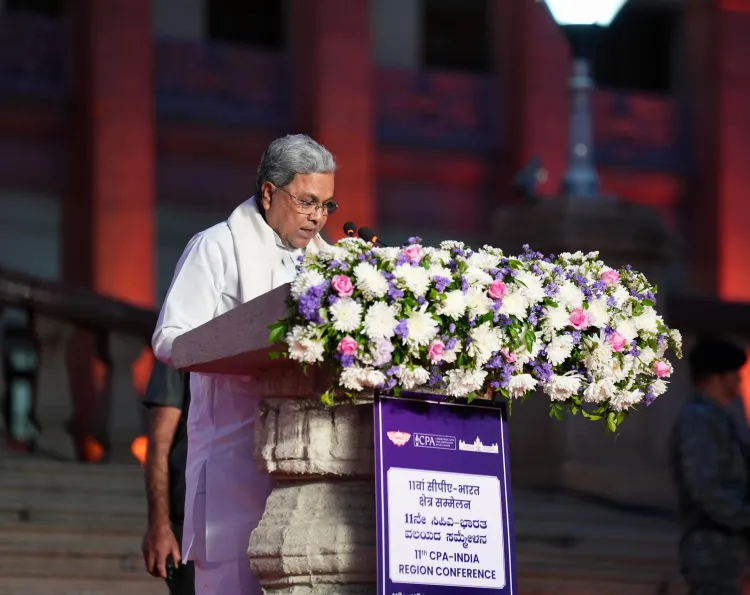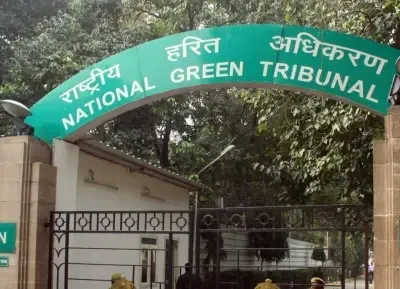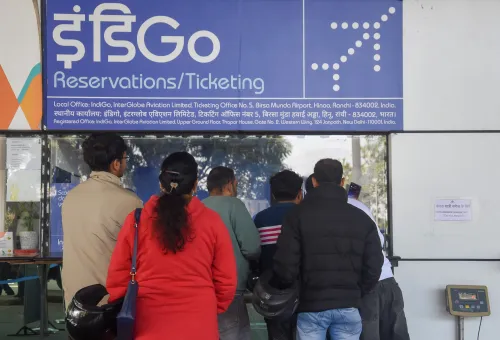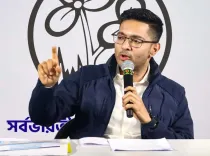'Misuse of identity' - How is Karnataka's CM Siddaramaiah Addressing Religious Politics?

Synopsis
Key Takeaways
- Misuse of identity can undermine democracy.
- Legislatures must foster inclusion, not exclusion.
- Public trust relies on authentic representation.
- Democracy thrives on respect, dialogue, and tolerance.
- India has a rich history of democratic traditions.
Bengaluru, Sep 11 (NationPress) Karnataka Chief Minister Siddaramaiah expressed on Thursday that when caste, religion, or language are exploited for political advantage, legislative bodies may turn into zones of exclusion instead of inclusion.
He spoke at the 11th Commonwealth Parliamentary Association India Region Conference held at the Vidhana Soudha in Bengaluru, Karnataka.
The theme for this conference, "Debates and Discussions in the Houses of Legislature: Building People's Trust and Meeting People's Aspirations," is both timely and timeless, he noted.
"The adversary of democracy is the misuse of identity to fracture society. When caste, religion, or language are manipulated for political objectives, legislatures risk becoming places of exclusion rather than inclusion," stated the Chief Minister.
True democracy should focus on identifying and empowering the most vulnerable, ensuring that our differences enrich rather than divide the nation, he added.
"Beyond official frameworks, democracy relies on habits of respect, dialogue, and tolerance. When public discussions devolve into hostility, and legislatures become venues for disruption rather than deliberation, the very essence of democracy begins to deteriorate," CM Siddaramaiah remarked.
"Without this culture, what Ambedkar referred to as Constitutional morality, even the most robust institutions cannot safeguard democracy," he added.
"Public trust relies not on uniformity but authenticity, on whether citizens feel that their diverse voices resonate genuinely within legislative halls. The capacity to listen, disagree, and build consensus is the ultimate measure of Parliamentary maturity," the Chief Minister stated.
"Democracy is more threatened by internal decay than external foes, when debate turns into despotism, when dialogue becomes monologue, and when legislatures become tools of partisanship rather than platforms for the common good," he emphasized.
"While democracy has proliferated globally, it confronts serious internal challenges that must be addressed," he opined.
"We convene here not just as representatives of our legislatures but as stewards of democracy in its most practical form," he said.
"As B.R. Ambedkar reminded us, democracy is not a foreign import to India, but a principle deeply embedded in our civilizational ethos," he added.
"Long before the establishment of modern Parliaments, India had a history of deliberation and collective decision-making, evident in the assemblies during the era of Buddha and the spread of Buddhism, as well as in village republics across our land. These were spaces where dialogue, persuasion, and consensus shaped collective life."
"In Karnataka, the spirit of democratic dialogue was epitomized by the Anubhava Mantapa, founded by Vishwa Guru Basavanna in the 12th century—a true 'Parliament of the People,' where men and women, workers, thinkers, and reformers gathered to discuss society, morality, and justice without fear or hierarchy," he highlighted.
"The Commonwealth Parliamentary Association (CPA) is not just an institution; it is a vibrant network of ideas, values, and aspirations. It unites nations and regions across continents, transcending geography and history, binding us through our commitment to parliamentary democracy, the rule of law, and human dignity," he remarked.
"In an era where the world faces increasingly transnational challenges such as climate change, inequality, technological disruption, conflict, and disinformation, this Association provides a unique platform to exchange best practices and reaffirm the moral foundations of governance," he added.
"For India, the CPA has profound significance. Our Parliament and State Legislatures serve as laboratories of federal democracy, where diversity is debated, dissent is honored, and unity is cultivated," he concluded.










